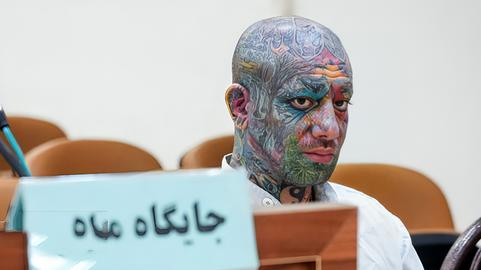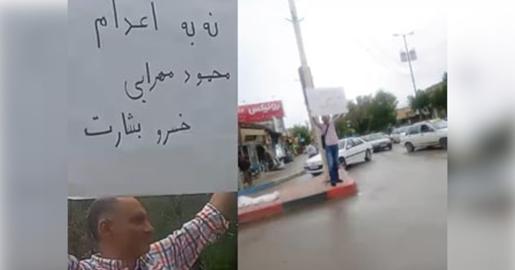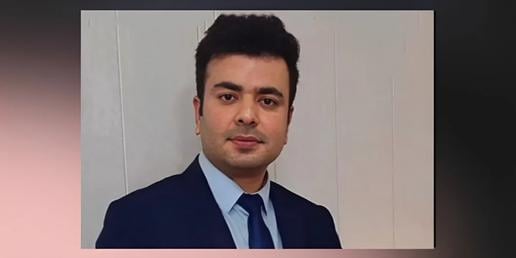
In autumn 2013, Bahram Sadeghi and Dikla Zeidler talked to Iranian-Israelis about their lives. Their documentary, Iranian Israelis: Life in the Shadow of a Conflict, was broadcast on Dutch television in November and received widespread attention on social media.
IranWire talked to filmmaker Bahram Sadeghi about the making of the documentary, the challenges he and Zeidler faced and his opinion about the general mood in Israel following the Geneva accord.
How has the documentary been received?
While it was airing on Dutch television, people were tweeting and it was very positive. And a couple of days later, I went to the cinema, and a lady said, “oh, I saw the programme you had made!" It was nice that it made an impact. After we put it on the internet, with the English version, we mostly got positive posts and comments – but also some very negative comments about some of the people in it, for example, the radio presenter Menashe Amir. Many see him as a friend of Israel and an enemy of Iran, but others saw him as a slave of Israel or a spy. There was also quite a nice conversation about Iranians sitting on carpets. Rita, the singer, the first time you see her talking in the film she points out a picture and says, ‘Look, this is us in Iran, we are sitting on carpets, like people often do.” We never thought it would be an issue, but some people see it as a sign of poverty or a huge generalisation about Iranian people, a negative stereotype.
In making the film, what did you want to achieve or discover? Were there any unexpected moments?
When you are making a documentary, you never know what you are going to see. We wanted to have some different angles on a very simple question: “What it is like to be an Iranian in Israel?” People talk about their past, how they arrived in Israel, their first images of the place, and what their situation was, and how it is for them now. It would be too straightforward if everybody complained about the situation in Israel, or if everybody was very pleased about the situation.
We selected those people because of the fact that they were all born in Iran. We wanted to talk to people who were born there, even if they only lived five years in Iran, like David Menashri, or the younger of the two radio DJs, who came to Israel when he was 16 or 17. For us, it was the most important thing to emphasise that there are different views, and to see a little bit of their lives. It was very nice to visit people at the radio stations, to see them while they are working. We hoped that Rita would sing for us. We had no idea about the video that Elham the artist had. So that was a surprise. That was an unexpected gift. And while we were filming, Amir got a telephone call directly from Iran, which was exceptional, because most of the people calling are from other countries from all over the world, from the United States, Eastern Europe, Western Europe. But when they get a call from Iran, they put everything on hold and they give them the airtime. It was great that it happened while we were there.
During the making of the film, what were the biggest challenges you faced? Were there any individuals or groups of people who were hesitant to talk to you or avoided particular topics? Did you feel there were taboos when making this film?
We would have loved to interview a member of parliament, a member of the Knesset [Shaul Mofaz], born in Iran, and he refused. We had contact with him – it was really bad luck, because when we started filming, the parliamentary season had started. So that was quite a shame. But, if he would really wanted to speak to us, he would have. It was a shame because Moffaz was born in Iran, he’s in the Knesset and he’s quite a right wing hardliner. There was a time, about a year ago, when he was vice prime minister of Israel. Someone said that he didn’t want to be associated with Iran that much. But we don’t know. And there was one other former member of Knesset who's reached the age now that he’s in commissions and CEO of a big construction company and he didn't speak to us either. It would have been nice for us to get an idea of how politicians with Iranian background deal with the threat of war.
About a year ago I interviewed Rita, right before the elections in Israel. I asked her some questions about politics. And she’s such a smart lady. She said, “No, you know, I’m not educated about politics. Politics needs very smart people who can talk about it.” She was so ironic, so I liked that.
Almost everyone we talked to were not willing to even think about the option of war although it’s maybe a realistic option, or it was a realistic option at that time. It was good that Rita said something about that for the film. The only thing that was sensitive was the question: “What will you do if it comes to war?" It’s something that you don’t want to think about.
Can you say a little about the mood in Israel following the recent Geneva accord?
My girlfriend, who is half Israeli, and I read a lot of Israeli newspapers and blogs. A lot of liberal, left wing people are pleased with this agreement. A friend of mine, a journalist who works for Haaretz, pointed out that the Israeli government took what Ahmadinejad said that very seriously. But why shouldn’t we take this just as seriously? Are we only going to take it seriously when they are threatening us?
We shouldn’t forget that it’s not only about the nuclear weapons. Because Iran can attack Israel if it wants to, with old-fashioned, conventional weapons. Saddam Hussein did in the past. The nuclear weapons threat makes it more horrible, but the simple fact is that the Iranian government still talks about Israel in terms of it being Zionistic entity and they don’t recognise the country. No journalist has asked that simple question of the Iranian government: “How about your basic, fundamental attitude towards Israel?" This idea that it is a Zionistic entity that suppresses all Muslims, and especially the Palestinian brothers, is still there. That rhetoric has not changed. And that’s troubling for Israelis.
Do you think the military service is different for Iranian Israelis than other Israelis?
In the film, the young radio DJ said he doesn't believe the Iranians. He said, “They are smiling, but I don’t trust them.” That happened about three weeks before the Geneva treaty. He said he read an article about a young Jewish Iranian who came to Israel when he was 16. He joined the army eventually, and he went on to become an officer. For him, it was like extra motivation to do much more than other soldiers, because now he was in the Holy Land, the Promised Land. If it meant that he had to go on really dangerous missions to Gaza, he said he would. But for that article, they changed his name and there was no picture of him. So it was a sensitive issue. Another example is when we went to see Professor David Menashri's lecture. And before he started, one of the members of the board of the university spoke. He was a former high general of the Israeli army. That's the funny thing about Israel – nobody questions Iranians loyalty. Everybody is in Israel is from somewhere else, from all over the world. The moment you say: "I am committed to Israel", they don't care whether you are 80 years old from Argentina or if you come to Israel when you are three years old.
At the same time, everybody has a second cultural background and that’s why we included stuff about the difference between Ashkenazi and Sephardim, because maybe that’s the bigger issue in Israel. Whether you are from Morocco or from Yemen or from Russia, that’s not a very big issue, but the question is: are you Sephardi or are you Askkenazi?
So there is a different between economics and opportunity, and sometimes there is racism?
Yes. And the cultural divide is there. I’ll give you an idea: my girlfriend knew Rita as a singer, because Rita is really big. She comes from an Ashkenazi background, they had none of Rita’s music in her family's house. For her, Rita was a huge icon, like Madonna. But she said her parents never listened to Sephardic music.
I once made a documentary about Somalis in Birmingham. All the Somali people in the United Kingdom live together. The same is maybe true for the Iranians and other people too. For Turkish people in Holland, whether they were born in Holland or in came there with Turkish parents, they are still Turks. A friend of mine's co-worker was born in Holland and is now 35 years old, and he’s still saying, “I’m a Turk.” After seeing your documentary, she said, “I understand, there’s this Iranian guy, he went to Israel when he was five years old and he’s almost 70, and he still speaks Farsi, listens to Farsi music, he has Persian artwork in his house. That’s the same as my co-worker!” But Israeli society is, for me, different. They are all Israelis. The most important difference is: those people chose to go to Israel.
As we show in the film, though, the unique problem for the Iranian community is they can’t go back to Iran, even to visit.
To view Iranian Israelis: Life in the Shadow of A Conflict,click here





















comments